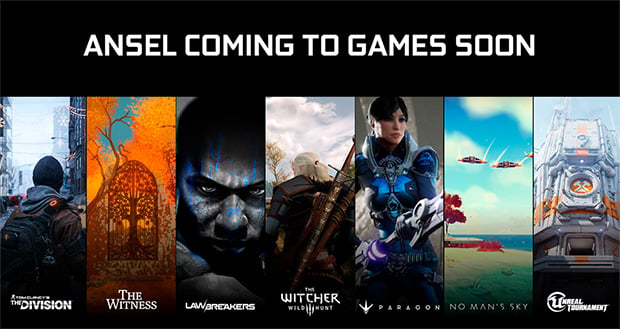NVIDIA To Credit Indie Dev For Reusing Shader Code In Ansel Game Capture Technology
In the gaming industry, it's not uncommon to hear about cases where one developer clips code from another. We've even seen it happen on Steam's Greenlight service, where some smaller developers churn out a quick game and "borrow" assets from other established games. It's not often though that we hear about this kind of thing involving a major OEM, like NVIDIA, for instance.
Alongside the launch of its first Pascal-based GPUs, NVIDIA released an advanced screen-capture tool called Ansel. With it, players can effectively pause a supported game, and then manipulate the view in free-cam mode. From there, they can capture the scene in one large static image or a 360° version. More artistic users can then take things to another level by taking advantage of a collection of filters NVIDIA provides, such as Black & White, Retro, and Halftone, among others.

Where some of those filters come from has been called into question, however. On Facebook, an independent developer by the name of Marty McFly Modding made a post which suggested that NVIDIA outright took his assets to create these filters, based on the fact that the developer recognized his own code. He suggested that other reused code might be present as well, perhaps from SweetFX or some other enhancement suite.
While many members encouraged Marty McFly Modding to pursue legal action against NVIDIA, it seems that everything has since settled down. In an update, the mod developer said that NVIDIA acknowledged the issue, and blamed it on "leftover code." The company also said that in the next rollout of Ansel, some of the infringing code would be removed, and acknowledgment for his work would be given.

Example of Marty McFly Modding's effects in The Witcher 3
While Marty McFly Modding could potentially spin a big deal out of this, the reason it hasn't is due to the fact that Ansel is not a commercial product; it just happens to be included for free to anyone who owns a modern NVIDIA graphics card.
The whole ordeal seems to have been settled here, but this situation still highlights a real problem: companies (or their programmer employees) often think nothing of borrowing code or other assets. It's certainly common practice with respect to open source software. Why reinvent the wheel, right? However, Marty's mods are anything but. In some cases, it might not even be easily discovered, but in this case it was. NVIDIA is a large, profitable company; so in this case it could have easily licensed the code, or worked with the developer to obtain reuse rights, give proper attribution and a little exposure beforehand. It's just good business.

